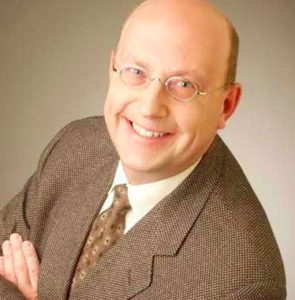About 350 years ago J.S. and the boys would gather at Zimmerman’s Coffee House in Leipzig, Germany to drink a little java and jam together as the Collegium Musicum.
J.S. — Bach that is — even wrote a short comic opera about the evils of the demon bean called the Coffee Cantata.
It’s the story of Aria, a coffee-loving young lady and her disapproving father who tells her she mustn’t drink the brew.
Dad tells Aria, if you don’t stop drinking coffee I won’t find you a husband. She decides she wants one of those but, clever girl, she writes into marriage contract that she can drink coffee when ever she likes. A very Baroque #metoo moment.
It’s a tale as old as time apparently and still full of potential for adaptation. That’s just what the Toronto composer, conductor, pianist and vocal coach Peter Tiefenbach has done — twice.

Peter Tiefenbach
“About 10 years ago, Stratford Summer Music asked me to write new words for the J.S. Bach Coffee Cantata. That ended up being called the Cappuccino Cantata. I called it the Lonely Barista but nobody ever seems to like my titles.”
Instead of the story being about a father and daughter talking about the evils of coffee it became a piece about a coffee store manager and the barista with whom he’s in love. Turns out she’s in love with the guy who comes in with his Mac Book and types away all day. It turns out Mac Book man only comes in because he thinks the manager is cute. There’s a lot of unrequited going on here.
“We remounted it last summer in Stratford in which we did a weekend of the Coffee Cantata and a weekend of the Cappuccino Cantata.
“At the end of that, an audience member said ‘I guess next year you are going to have to do the Cannabis Cantata’ and Mark Fewer, who is the new music director at Stratford Summer Music, said ‘There’s a free idea. Let’s do it’. So he got together with Roman Borys at Chamberfest and they commissioned the piece.”
Tiefenbach “had to figure out how to approach this. It’s such a wide topic. Not one, to be honest, that I have a lot of experience with (ahem) … Fair enough, I did a limited amount of research. One must always do field work.
“I was talking to people about it over a period of months and everybody had a different take on it. People in their 20s would tell me they’d go home from university and their parents would be smoking up in the back bedroom. People in their 70s and 80s were taking it for pain or to sleep.”
But in the end how could it not be anything but a look at the comic opera that is Canada coming to grips with the new legal reality.
“Suddenly there is a new substance to play with.”
Tiefenbach grew up listening to Cheech and Chong and the famous ‘Dave’s not here, man.’ I knew all that stoner comedy had been done 1,000 times.”
So he went a different way.
The piece features a number of scenes featuring the same couple, he said. She has back problems and so they go out and try to get some weed. There are misadventures along the way.
“That’s based on a true experience of someone I know who had back pain and ended up trying an edible one night and having a very bad experience.
“That’s ripe for comedy. The essence of comedy is something bad happening to someone else.”
These days we exist in grey world between legal and illegal weed. Legalization is evolving in different ways in different provinces. It’s kind of painful in places like Ontario.
Some of the piece is set historically, Tiefenbach said.
“There is one scene on Parliament Hill with a couple of MPs who are there with a public servant. They are trying to figure out what they are going to call marijuana when they legalize it because they can’t call it marijuana or pot. So they go through every name I could find on the internet and discard each one by one until they realize it has to be cannabis and they go ‘Cannabis, Cannabis I know it’ … it’s a little nod to Camelot” he said.
“Then they decide ‘We’ll all call it Cannabis across our home and native land and also in Quebec’.”
I called it a Musical ‘Pot’ Pourri and that has given me license to compose in whatever style I wanted.”
There are couple of nods to Bach and the Baroque form, he said. It opens with an overture and there is a little sicilienne when the woman is waiting for the edible to kick in.
“There is a gavotte that the MPs do because I always thought it would be fun to watch MPs gavotte.” And it ends with a waltz.
“I started thinking about people being addicted to all sorts of substances and the last scene starts with the three singers coming in, each with one of a cup of coffee, a martini glass and the last guy is rolling a joint in a $20 bill, then they talk about their addictions which aren’t coffee, alcohol or pot.
“Some people won’t necessarily see these as detrimental to society but an addiction is an addiction. It’s whatever you don’t have control over.”
“I get addicted to things quite easily and I then have to adopt a kind of cold turkey strategy, which works for me. I was spending too much time on Facebook 10 years ago and said OK that’s it, I’m off Facebook. Then it was twitter.
“Everyone has something like that in their life. Maybe it’s running. These are not necessarily bad things, but it does give us an idea about how the mind works.
“And it might give us some understanding and sympathy for those battling an addiction.”
He isn’t sure if this Cannabis Cantata has a future.
“Let’s see how this one works first. It is very strange to write comedy by yourself and hope it’s funny. I have been test-driving it and people are laughing so it seems to be working. I have tried to include something to offend everyone.”
The piece will have performances in Ottawa, Stratford and at the Leith Summer Festival near Owen Sound.
It’s too bad it’s a little early for edibles or Chamberfest could make a ton at front of house. Then again the audience might lose focus after intermission.
Chamberfest presents a Cannabis Cantata
Where: Ottawa Art Gallery
When: July 29 at 10 p.m.
Tickets and information: chamberfest.com







